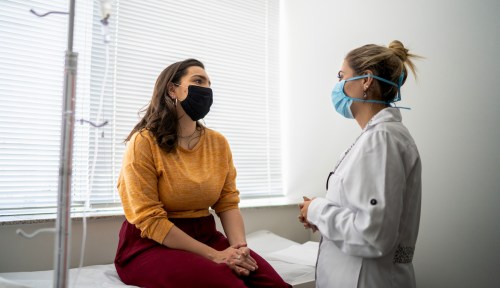The last two years have prompted many people to put their routine health-care checkups on the back burner. Forty seven percent of Americans said they delayed or canceled meeting with their medical care providers since the pandemic started due to COVID-related stress—and women (particularly BIPOC women) were more likely than men to skip preventative health appointments. This year, however, many people have vowed to return to their physicians, and finally “check up” on their health and well-being. And when it comes to your women’s wellness exam, there are a handful of matters to discuss and questions to ask your gynecologist, which we’ll get into below.
Experts in This Article
board-certified OB/GYN and chief medical director at Bonafide Health
Julia is a licensed, board-certified genetic counselor with more than 12 years of experience. Specializing in reproductive health and women’s genetics, she has provided clinical care in both academic and industry-based settings, including Genzyme Genetics, Emory Genetics, and UMass Medical Center and Medical School.
But first, it’s important to know that’s there’s no need to feel bad or ashamed if you’ve put off your visit during the pandemic. “It has been a long time for many people, and there is nothing to be embarrassed about,” says Julia Wilkinson, a certified genetic counselor at Invitae. “The important thing is to get back on track with your health and re-establish a relationship with someone who can provide ongoing care, especially if you will be trying to conceive in the near future.”
Even if you’re not trying to get pregnant, though, your annual gynecologist appointment is still important for myriad other reasons. “It’s often primary care for many,” says New York gynecologist Alyssa Dweck, MD. “Traditionally, GYN issues—including contraceptive issues, screening for disease, abnormal bleeding/menstrual concerns, menopause, and sexual concerns—need to be addressed regularly. Prevention is key.”
With all that in mind, here are the big five topics to surface in your next OB/GYN appointment. And remember: This is your time to address anything and everything that’s been bothering you health-wise. Don’t hesitate to get your questions answered.
1. Update your doctor on what’s new in your life
“It’s important to remind your clinicians of how things were the last time you saw them, and provide an update of what things have changed or stayed the same—especially if it has been a while since your last appointment,” says Wilkinson. “This helps to establish the baseline of your health and determine what issues or medications may need further discussion.” You should let them know, for example, if you changed your diet, started a new exercise routine, switched your prescriptions with a telehealth professional, or have been experiencing any new aches and pains. That way, they can help you navigate your health with a full picture in mind.
2. Ask them about any pending elective surgeries
In the last two years, many elective procedures have been put on pause to prioritize the treatment of COVID-19 patients. “Elective surgeries [have been] put on hold, delaying treatment of important issues like ovarian cysts, fibroids, endometriosis, and irregular bleeding,” says Dr. Dweck. If any of your elective surgeries were paused, make sure to update your gynecologist so they can help you make a plan for rebooking them and receiving any follow-up care you might need.
3. Ask them if you’re up to date on my routine health screenings and vaccinations
While you’re at the gynecologists office, ask them to walk you through what health screenings you will be receiving that day, and update them if your family history has changed. (For example, if a family member has developed diabetes, heart problems, or cancer since your last visit.) “An essential part of annual check-ups is screenings like breast exams, PAP smears, and skin exams to check for early signs of cancer and testing for STDs,” says Wilkinson. In particular, Dr. Dweck recommends asking about breast, cervical, and colon cancer screenings.
“Your clinician will also keep you up to date on vaccinations that need booster shots—like tetanus, diphtheria, and pertussis (TDAP) or may be administered yearly, like the flu,” adds Wilkinson. So if you aren’t sure whether or not you’re up-to-date on your shots, go ahead and ask your doctor. Vaccines are a key part of prevention.
4. Tell them about any changes in your sexual or menstrual health
If your period has changed during the pandemic, this is a great time to let your gynecologist know, “Irregular menstrual cycles, significant cramps, or mood changes around the start of your period, unusual vaginal discharge, and pain or discomfort during intercourse may all be signs that something else is going on,” says Wilkinson. “Especially if it is causing you significant discomfort or interfering with your daily life, you do not just have to tolerate it. Your clinician will likely be able to investigate why you are experiencing those symptoms and find ways to help.” For what it’s worth, 75 percent of people with vulvas will have painful sex in their lifetime—so you are not alone.
5. Fill them in on any plans you’ve made in the family department
If you’re someone who wants a family, Dr. Dweck recommends asking your doctor about your fertility. It’s scary, but time away from the doctor means you may have developed increase risk factors for infertility, or that you’ve moved into an age bracket that makes it more difficult to conceive. “Your doctor may want to check some blood levels, like your thyroid and a complete blood count (CBC),” adds Wilkinson. “It is also a great time to consider pre-conception genetic testing for conditions that may impact your reproductive decisions and the health of your future children.”
Oh hi! You look like someone who loves free workouts, discounts for cutting-edge wellness brands, and exclusive Well+Good content. Sign up for Well+, our online community of wellness insiders, and unlock your rewards instantly.
Sign Up for Our Daily Newsletter
Get all the latest in wellness, trends, food, fitness, beauty, and more delivered right to your inbox.
Got it, you've been added to our email list.











